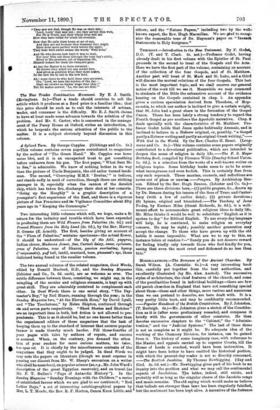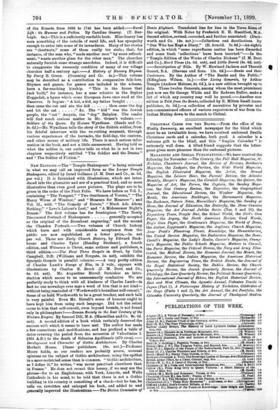Mrscattauxous.—The Romance of Our Ancient Churches. By Sarah Wilson. (A.
Constable. 6s.)—A very interesting book this, carefully put together from the best authorities, and excellently illustrated (by Mr. Alex. Ansted). The successive styles of architecture, the chief features of the church, and some of the peculiarities found in individual buildings—there are few old parish churches in England that have not something special about them—these and other things, more various and numerous than we can pretend to describe, are here dealt with. It is a. very pretty little book, and may be confidently recommended. —Popular Handbook of the British Constitution. By J. Johnston. (T. Burleigh. 6s.)—Mr. Johnston gives a sketch of the Constitu- tion as it is (after some preliminary remarks), and compares it briefly with the governments of other countries. He then devotes successive chapters to the "Cabinet," the " Adminis, tration," and the "Judicial Systems." The last of these three is not as complete as it might be. No adequate idea of the working of the Chancery Division, for instance, can be gained from it. The history of some imaginary case, with reference to the Master, and appeals carried up to superior Courts, till the House of Lords is reached, would have been instructive. It might have been better to have omitted the historical portion, with which the present-day reader is not so directly concerned. —The Scottish Jacobites. By Thomas Newbigging. (Gay and Bird. 3s. 6d. net.)—Mr. Newbigging gives part of his book to an inquiry into the position and what we may call the sentimental aspects of Jacobitism. The latter, indeed, still exists, and probably will as long as the singular charm of the Jacobite songs and music remains. The old saying which would make us believe that ballads are stronger than laws has been singularly falsified, but the sentiment has been kept alive. A narrative of the fortunes of the Stuarts from 1688 to 1745 has been added.—Rural Life : its Humour and Pathos. By Caroline Gearey. (T. Bur- leigh. 6s.)—This is a sufficiently readable book. Miss Gearey has seen something of the outside of rural life, and has sympathy enough to enter into some of its inwardness. Many of her stories are "chestnuts," some of them really too stale ; that, for instance, of the man who, "made another man" by some refresh- ment, "wants another glass for the other man." The churches naturally furnish some strange anecdotes. Indeed, it is difficult to exaggerate the unseemly condition of many of our village churches half a century ago.—A History of Nursery Rhymes. By Percy B. Green. (Greening and Co. 4s.)—This volume may be described as a contribution to comparative folk-lore. Rhymes and games, for games are included in the scheme, have a far-reaching kinship. "This is the house that Jack built," for instance, has a near relative in the Sepher Haggadah, a hymn which some European Jews once used at the
Passover. It begins : "A kid, a kid, my father bought then came the cat and ate the kid then came the dog and bit the cat . " &c. The " kid " was the Jewish
people, the " cat " Assyria, the ' dog " Babylon. The reader will find much curious matter in Mr. Green's volume.— Soldiers of the queen. By Horace Wyndham. (Sands and Co. 38. 6d.)—Mr. Wyndham tells the story of the British soldier, from his fateful interview with the recruiting sergeant, through various experiences of the barracks, the field-day, the canteen, and other scenes of military life. There is much serious infor- mation in the book, and not a little amusement. Having told us what the soldier is, our author tells us what he is not in two chapters respectively entitled "The Soldier and the Drama" and "The Soldier of Fiction."











































 Previous page
Previous page